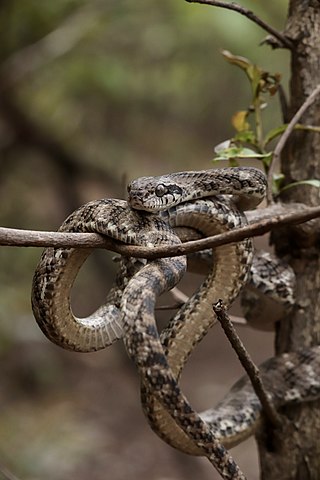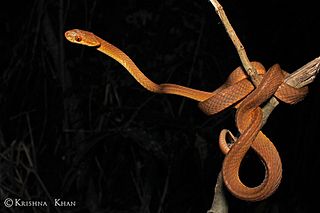
Boiga is a large genus of rear-fanged, mildly venomous snakes, known commonly as cat-eyed snakes or simply cat snakes, in the family Colubridae. Species of the genus Boiga are native to southeast Asia, India, and Australia, but due to their extremely hardy nature and adaptability, have spread to many other suitable habitats around the world. There are 38 recognized species in the genus. According to the study done by Jiří Smíd regarding Old World cat snakes, the ancestor of the cat snake originated in Africa, from where it diversified and expanded to other countries. Despite this diversity however, the different species have very similar needs in terms of temperature and precipitation.

Ahaetulla prasina is an arboreal, moderately venomous species of opisthoglyphous snake in the family Colubridae to southern and Southeast Asia. Its common names include the Asian vine snake, Boie's whip snake, Gunther's whip snake, and the Oriental whip snake.

Boiga andamanensis, known commonly as the Andaman cat snake, is a species of rear-fanged snake in the family Colubridae. The species is endemic to the Andaman Islands.

Boiga beddomei, commonly known as Beddome's cat snake, is a species of rear-fanged snake in the family Colubridae. The species is endemic to the Western Ghats of India, in Maharashtra, Gujarat and Goa states.

Boiga ceylonensis is a species of rear-fanged, mildly venomous, nocturnal, arboreal colubrid snake endemic to Sri Lanka.

Boiga cyanea, commonly known as the Green cat snake, is a colubrid snake species found in South Asia, China and South-east Asia.

Boiga cynodon, commonly known as the dog-toothed cat snake, is a nocturnal species of rear-fanged colubrid snake endemic to Asia.

Boiga dendrophila, commonly called the mangrove snake or the gold-ringed cat snake, is a species of rear-fanged venomous snake in the family Colubridae. The species is endemic to southeast Asia. It is one of the biggest cat snake species, averaging 8–9 feet in length. It is considered mildly venomous. Although moderate envenomations resulting in intense swelling have been reported, there has never been a confirmed fatality.

Boiga dightoni, commonly known as Dighton's catsnake, the Pirmad cat snake, and the Travancore cat snake, is a species of rear-fanged mildly venomous snake in the family Colubridae. The species is endemic to the Western Ghats of India.

Boiga forsteni, also known commonly as Forsten's cat snake, is a species of mildly venomous rear-fanged snake in the family Colubridae. The species is endemic to South Asia.

The many-banded tree snake is a species of rear-fanged colubrid. Not much is known about it and it is rated as "data deficient" by the IUCN.

Boiga ochracea, commonly called the tawny cat snake, is a species of rear-fanged snake in the family Colubridae. The species is endemic to South Asia.

Boiga trigonata, commonly known as the Indian gamma snake or common cat snake, is a species of rear-fanged colubrid endemic to South Asia.

The rice paddy snake, also known as grey water snake, Boie's mud snake, yellow or orange bellied water snake, lead water snake or plumbeous water snake is a species of mildly venomous, rear-fanged snake endemic to South Asia. It is somewhat common, and is one of the most widespread species of water snake in Asia.

Lycodon aulicus, commonly known as the Indian wolf snake or common wolf snake, is a species of nonvenomous snake found in South Asia and Southeast Asia. Early naturalists have suggested its resemblance to the venomous common krait as an instance of Batesian mimicry.

Gonyosoma oxycephalum, known commonly as the arboreal ratsnake, the red-tailed green rat snake, and the red-tailed racer, is a species of snake in the family Colubridae. The species is endemic to Southeast Asia.
The orange-collared keelback is a species of snake. As with its congenerics, this is a reared-fanged species. The toxicity of its venom is not known, but it overpowers its prey quickly. Even if it is considered harmless, an allergic reaction from the bite can still occur, and all bites should be taken seriously.

Boiga drapiezii, commonly known as Drapiez's cat snake and the white-spotted cat snake, is a species of long and slender rear-fanged snake in the family Colubridae. The species is native to Maritime Southeast Asia and is common throughout its range.

The gray cat snake, also known as eyed cat snake or Siamese cat snake is a species of catsnake found in northeastern India, Bangladesh, Myanmar, Cambodia, Thailand, Malaysia, Vietnam. and Nepal



















